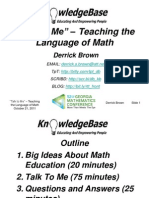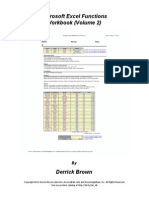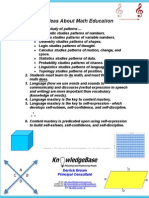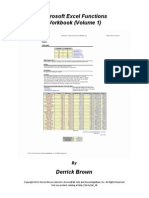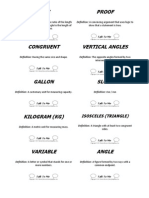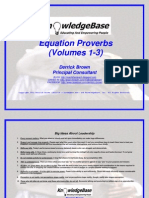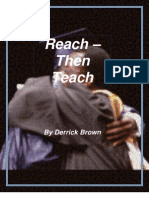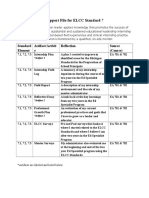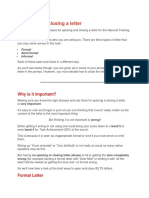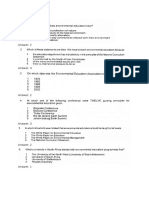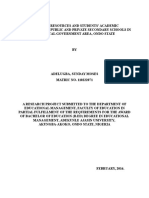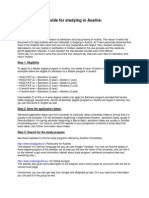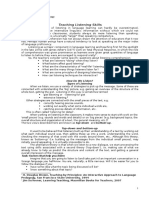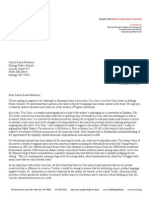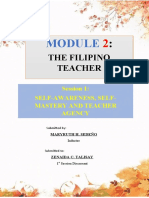Professional Documents
Culture Documents
Using "Talk To Me" To Teach The Language of Math!
Uploaded by
Derrick BrownOriginal Title
Copyright
Available Formats
Share this document
Did you find this document useful?
Is this content inappropriate?
Report this DocumentCopyright:
Available Formats
Using "Talk To Me" To Teach The Language of Math!
Uploaded by
Derrick BrownCopyright:
Available Formats
Using Talk To Me
ACCOUNTABILITY
Definition: Being held responsible for actions.
PERIMETER
Definition: Sum of the length of all sides in a polygon.
Talk To Me
Copyright 2011 Derrick Brown & KnowledgeBase, Inc.
Talk To Me
Copyright 2011 Derrick Brown & KnowledgeBase, Inc.
To Teach The Language of Math!
By Derrick Brown
October 2011
Copyright 2011 Derrick Brown (derrick.s.brown@att.net) and KnowledgeBase, Inc. All Rights Reserved. See our TpT product catalog at http://bit.ly/tpt_db
Email: derrick.s.brown@att.net TpT: http://bitly.com/tpt_db SCRIBD: http://scr.bi/db_kb BLOG: http://bit.ly/rtt_front LINKED IN: http://www.linkedin.com/in/dbrowndbrown FACEBOOK: http://www.facebook.com/derrick.s.brown
Using Talk To Me To Teach The Language Of Math! (By Derrick Brown)
Page 2 of 24
Contents
About The Author ............................................................................................................... 3 Big Ideas About Math Education ........................................................................................ 4 About Talk To Me ............................................................................................................... 4 What Are Talk To Mes Rules? ........................................................................................... 5 How Was Talk To Me Created? .......................................................................................... 6 The Motivation................................................................................................................ 6 The Problem .................................................................................................................... 7 The Initial Solution ......................................................................................................... 7 Back To The Drawing Board .......................................................................................... 8 The Revised Solution .................................................................................................... 11 Evaluating The Status Quo of Math Student Achievement At Our School .................. 12 Influential Anecdotal And Research-Based Support For Talk To Me ...................... 15 Marva Collins' Views Regarding Teaching Vocabulary vs. Teaching Language & Communication ......................................................................................................... 15 Robert Moses' Algebra Project Transition (6th-7th-Grade) And High School Algebra & Geometry Curricula .............................................................................................. 15 A Program For Raising The Level Of Student Achievement In Secondary School Mathematics (Professor Frank B. Allen) .................................................................. 16 How Can I Use Talk To Me In My Classroom?................................................................ 18 1. To Review Content Before Assessments .................................................................. 18 2. For Real-Time Assessment (Teacher-Led Talk To Me) ........................................... 19 3. As A Student-Led Project (The Talk To Me Math Challenge) ................................ 19 How Can I Get My Own Copy Of Talk To Me? ............................................................... 23
Copyright 2011 Derrick Brown (derrick.s.brown@att.net) and KnowledgeBase, Inc. All Rights Reserved. See our TpT product catalog at http://bit.ly/tpt_db
Email: derrick.s.brown@att.net TpT: http://bitly.com/tpt_db SCRIBD: http://scr.bi/db_kb BLOG: http://bit.ly/rtt_front LINKED IN: http://www.linkedin.com/in/dbrowndbrown FACEBOOK: http://www.facebook.com/derrick.s.brown
Using Talk To Me To Teach The Language Of Math! (By Derrick Brown)
Page 3 of 24
About The Author
Derrick is a newlywed, having married the former Keisha Lanier on March 26, 2011. They reside in Marietta, GA. His other passion is empowering people via methods that balance skill & will, analysis & synthesis, ideas & execution, and activity & achievement. He has published a digital catalog of more than 70 short films, learning games, visual dictionaries, poems, essays, newsletters, inspirational posters, and projects. He has also delivered more than 30 presentations, workshops, keynote addresses, and invited lectures at conferences, high schools, colleges, universities, and churches. From 2004-2010, he served as a founding faculty member, governing board representative, Director of Corporate Relations, Dean of Students, and Assistant Principal of Tech High (Charter) School in Atlanta GA. Derrick is originally from Elloree, SC, a rural community in central South Carolina.
Copyright 2011 Derrick Brown (derrick.s.brown@att.net) and KnowledgeBase, Inc. All Rights Reserved. See our TpT product catalog at http://bit.ly/tpt_db
Email: derrick.s.brown@att.net TpT: http://bitly.com/tpt_db SCRIBD: http://scr.bi/db_kb BLOG: http://bit.ly/rtt_front LINKED IN: http://www.linkedin.com/in/dbrowndbrown FACEBOOK: http://www.facebook.com/derrick.s.brown
Using Talk To Me To Teach The Language Of Math! (By Derrick Brown)
Page 4 of 24
Big Ideas About Math Education
These big ideas guide my thinking and approaches to teaching and learning in all subjects: 1. Math is the study of patterns ... Arithmetic studies patterns of numbers. Algebra studies patterns of variable numbers. Geometry studies patterns of shapes. Logic studies patterns of thought. Calculus studies patterns of motion, change, and space. Statistics studies patterns of data. Probability studies patterns of chance. Linguistics studies patterns of language. Topology studies patterns of position. 2. Students must learn to do math, and must then learn what math does. 3. Language (how we use words and sounds to communicate) and discourse (verbal expression in speech and writing) are more important than vocabulary (knowledge of words). 4. Language mastery is the key to content mastery. 5. Language mastery is the key to self-expression - which develops self-esteem, selfconfidence, and self-discipline.
6. Content mastery is predicated upon using self-expression to build self-esteem, self-confidence, and self-discipline.
Copyright 2011 Derrick Brown (derrick.s.brown@att.net) and KnowledgeBase, Inc. All Rights Reserved. See our TpT product catalog at http://bit.ly/tpt_db
Email: derrick.s.brown@att.net TpT: http://bitly.com/tpt_db SCRIBD: http://scr.bi/db_kb BLOG: http://bit.ly/rtt_front LINKED IN: http://www.linkedin.com/in/dbrowndbrown FACEBOOK: http://www.facebook.com/derrick.s.brown
Using Talk To Me To Teach The Language Of Math! (By Derrick Brown)
Page 5 of 24
About Talk To Me
Language (how we use words and sounds to communicate) and discourse (verbal expression in speech and writing) are more important than vocabulary (knowledge of words). Talk To Me is a game show (in the tradition of Taboo and Pictionary) that requires teams of contestants to build language and discourse skills by guessing vocabulary terms from verbal and/or pictorial clues presented by a single teammate. The clue giver is provided with the term's formal definition (which does not always help)!
What Are Talk To Mes Rules?
Teams take turns giving and guessing clues for 30-90 seconds per round. The game host and commissioner decide the actual length of each round, as well as the number of rounds per game. At the end of the game, the team that guessed the most terms correctly wins! Required Materials & Suggested Roles Talk To Me card sets Whiteboard with markers (one for clues, one for scorekeeping) Egg timer (30-90-second) or watch Scorekeeper Timekeeper Commissioner (peacekeeper) Host
Copyright 2011 Derrick Brown (derrick.s.brown@att.net) and KnowledgeBase, Inc. All Rights Reserved. See our TpT product catalog at http://bit.ly/tpt_db
Email: derrick.s.brown@att.net TpT: http://bitly.com/tpt_db SCRIBD: http://scr.bi/db_kb BLOG: http://bit.ly/rtt_front LINKED IN: http://www.linkedin.com/in/dbrowndbrown FACEBOOK: http://www.facebook.com/derrick.s.brown
Using Talk To Me To Teach The Language Of Math! (By Derrick Brown)
Page 6 of 24
How Was Talk To Me Created?
The Motivation
As an elementary, middle, and high school student, I loved math for its structure, innate beauty, and applicability. I enjoyed the challenge of being assigned the even-numbered problems for homework (the ones whose answers were not in the back of the book), and enjoyed solving word problems of all kinds. As a college (Clemson University) and graduate (Georgia Tech) electrical engineering student, math seemed to change. It was no longer based solely on numeracy and problem solving. It started to take on a more verbal, logical, and proof-oriented form. Algebra gave way to The Calculus, Probability became Random & Stochastic Processes, and Linear Algebra morphed into Finite Dimensional Vector Spaces. Equations with two unknowns were replaced by systems of equations, the average became the expected value, and number-filled matrices were replaced with eigenvalues and eigenvectors. Definitions and notation were now emphasized much more than processes, rigor, and repetition. Accepting the change was difficult as first, but my transition was eased by a work ethic that required me to do whatever I had to do to survive, advance, and succeed. The trial I experienced deepened my admiration for math. I became steadfast in my pursuit of a new, more mature verbal and analytical approach to learning because of the wise words of a fellow graduate student - who told me that "In grade school, you learn how to do math ... in college you learn to speak it - and then you learn what math really does." My college and graduate school experiences motivated me to understand why the language of math was not emphasized sooner - in order to prepare students to engage in the higher-level thinking and communicating required to engage in the more rigorous math courses. Discovering the answer to this question motivated me to volunteer at several elementary and middle after-school programs, before eventually becoming a high school computer programming, math, and pre-engineering teacher, as well as Dean of Students and Assistant Principal.
Copyright 2011 Derrick Brown (derrick.s.brown@att.net) and KnowledgeBase, Inc. All Rights Reserved. See our TpT product catalog at http://bit.ly/tpt_db
Email: derrick.s.brown@att.net TpT: http://bitly.com/tpt_db SCRIBD: http://scr.bi/db_kb BLOG: http://bit.ly/rtt_front LINKED IN: http://www.linkedin.com/in/dbrowndbrown FACEBOOK: http://www.facebook.com/derrick.s.brown
Using Talk To Me To Teach The Language Of Math! (By Derrick Brown)
Page 7 of 24
The Problem
The direct interactions that I had with students and teachers while working in middle and high schools suggested that the instructional approach to math had not changed much in the 15-20 years since I had left middle school. Middle and secondary school math instruction still followed an approach that emphasized mastering problem solving processes through rigorous, repetitive, and often rote methods. The emphasis placed on problem solving methods was not accompanied by an equal emphasis on developing language skills that facilitated the translation between natural language and math notation. My informal conversations with teachers never yielded a satisfactory answer as to why language was not emphasized more. The most frequent response was that teaching mandated state standards did not leave enough instructional time to devote to building math language skills. The second most frequent response challenged the very notion that there was this inseparable link between language and math.
The Initial Solution
I initially saw the lack of emphasis placed on building math language skills as a problem that might be best addressed by creatively demonstrating the prevalence, importance, and sheer beauty of language to math teachers and students. To accomplish this, in 2003 I created a game called Talk To Me to promote the creative and systematic development of students verbal command of subject-specific language via an educational, entertaining game. I created and tested early versions of the game as classroom manipulatives that augmented each of the subjects I taught as a roving high school instructor and long-term substitute. The name Talk To Me was coined during an early test of the game. A frantic clue giver was frustrated by opposing team members distracting her team members by purposely giving them the wrong answers. During a stoppage in play, she admonished her teammates to "Talk to me ... do not worry about him or them ...". That moment symbolized the awareness I wanted to promote to math teachers and students that building language skills and learning to communicate effectively were critical
Copyright 2011 Derrick Brown (derrick.s.brown@att.net) and KnowledgeBase, Inc. All Rights Reserved. See our TpT product catalog at http://bit.ly/tpt_db
Email: derrick.s.brown@att.net TpT: http://bitly.com/tpt_db SCRIBD: http://scr.bi/db_kb BLOG: http://bit.ly/rtt_front LINKED IN: http://www.linkedin.com/in/dbrowndbrown FACEBOOK: http://www.facebook.com/derrick.s.brown
Using Talk To Me To Teach The Language Of Math! (By Derrick Brown)
Page 8 of 24
components in mastering all subjects, but especially in math.
Debut of Talk To Me At 2004 Arthur Blank Family Fellows (BFF) Youth Summer Internship Program (YSIP) Interview Day (February 16, 2004)
Back To The Drawing Board
As stated earlier, I created Talk To Me to informally address what I perceived as the lack of awareness of the critical need to build language and communication skills in math classes. At first, I paid little attention to using it as a formal tool of instruction. I would soon be motivated to change course once I saw the way students played the game. Early tests of the game in my classroom and several other classrooms and school assemblies yielded a few key, but painful observations: 1. Students rarely described the game terms using the appropriate academic context. They would instead use the first context that came to mind - which was usually a popular culture reference. For example, when describing the term line from the Geometry version of the game, they would often use clues like "These are too long at the movies!" or "The electric slide is what type of dance?". These methods
Copyright 2011 Derrick Brown (derrick.s.brown@att.net) and KnowledgeBase, Inc. All Rights Reserved. See our TpT product catalog at http://bit.ly/tpt_db
Email: derrick.s.brown@att.net TpT: http://bitly.com/tpt_db SCRIBD: http://scr.bi/db_kb BLOG: http://bit.ly/rtt_front LINKED IN: http://www.linkedin.com/in/dbrowndbrown FACEBOOK: http://www.facebook.com/derrick.s.brown
Using Talk To Me To Teach The Language Of Math! (By Derrick Brown)
Page 9 of 24
were creative and often humorous, but strayed from the games true intent. 2. When students did attempt to describe game terms using the academic context, they would often use related (but incorrect) terms. For example, when describing the term isosceles triangle from the Geometry version, students would give clues like "this is a triangle with only two congruent sides". Students would then shout "Scalene ... equilateral ... ISOSCELES!" After I saw this approach repeatedly, I began to humorously call it the Right Church, Wrong Pew method. 3. Students would be distracted from the game's didactic intent by the lure of competition. Beating their opponent often overshadowed learning the terms the game attempted to reinforce. No matter what I tried (incentives, penalties, smaller teams, extended time), the games would often become wayward due to the above observations. I became frustrated, and retired the game for almost a year to allow time to refresh my perspective and redirect my approach. This coincided with my promotion to school administration, so my new role complemented my need for a design break.
Copyright 2011 Derrick Brown (derrick.s.brown@att.net) and KnowledgeBase, Inc. All Rights Reserved. See our TpT product catalog at http://bit.ly/tpt_db
Email: derrick.s.brown@att.net TpT: http://bitly.com/tpt_db SCRIBD: http://scr.bi/db_kb BLOG: http://bit.ly/rtt_front LINKED IN: http://www.linkedin.com/in/dbrowndbrown FACEBOOK: http://www.facebook.com/derrick.s.brown
Using Talk To Me To Teach The Language Of Math! (By Derrick Brown)
Page 10 of 24
Talk To Me Theme Song (March 28, 2004)
Copyright 2011 Derrick Brown (derrick.s.brown@att.net) and KnowledgeBase, Inc. All Rights Reserved. See our TpT product catalog at http://bit.ly/tpt_db
Email: derrick.s.brown@att.net TpT: http://bitly.com/tpt_db SCRIBD: http://scr.bi/db_kb BLOG: http://bit.ly/rtt_front LINKED IN: http://www.linkedin.com/in/dbrowndbrown FACEBOOK: http://www.facebook.com/derrick.s.brown
Using Talk To Me To Teach The Language Of Math! (By Derrick Brown)
Page 11 of 24
The Revised Solution
For our faculty retreat during my second year as an administrator, my principal asked me to lead our staff in a discussion about key issues that we needed to think about creatively and constructively. Our staff was comprised of several strong-willed, independent thinkers from rather diverse backgrounds, so any open-ended discussions often strayed from their focus quickly. I had not worked with Talk To Me for a while, so I decided to try it in this context by adding a slight change. Instead of dividing our diverse group of independents into teams, I asked them to all play on the same team, and to allow me to give the clues. To my surprise, this approach proved to be effective in two key ways: 1. It allowed me to lead a controlled, directed discussion by giving clues that "spoke to" key staff members who may have had attitudes and opinions that they were reluctant to share. By "talking to them", and getting them to correctly guess the term, I then started a forum that had them "talk to me" so that I could present an alternative view that then facilitated a balanced discussion. For example, the word discipline always carried multiple meanings to our faculty members. By giving the clue "our system of rules", those who held this view quickly chimed in with the answer. I then followed up the answer by asking if there was room to also view discipline as an "affirming manner of teaching and training students in proper behavior", which then allowed faculty members with that perspective to join the discussion. 2. For terms included in the game to give our faculty firm, gentle redirection, I would use a purposely vague, open-ended clue, and would then clean up the improper responses with the correct answer. For example, for the term "tardy", I said "If you arrive at work at 7:50 A.M., you are ...". After the room shouted "ON TIME!" in unison, I then informed them that they needed to arrive at 7:35 A.M. This alternative design environment serendipitously armed me with a new approach to the game that I called "Cheese and Broccoli" - because it basically presented a formal lecture disguised by an entertaining, interactive, and attractive presentation format.
Copyright 2011 Derrick Brown (derrick.s.brown@att.net) and KnowledgeBase, Inc. All Rights Reserved. See our TpT product catalog at http://bit.ly/tpt_db
Email: derrick.s.brown@att.net TpT: http://bitly.com/tpt_db SCRIBD: http://scr.bi/db_kb BLOG: http://bit.ly/rtt_front LINKED IN: http://www.linkedin.com/in/dbrowndbrown FACEBOOK: http://www.facebook.com/derrick.s.brown
Using Talk To Me To Teach The Language Of Math! (By Derrick Brown)
Page 12 of 24
This new approach allowed me to model the proper way to play "Talk To Me" for students by giving clues in the appropriate context using simple, illustrative examples that would help to teach them the terms in a given game version at the beginning of a unit of instruction. We would then play the game using that version at the end of the instruction unit, which would allow time for students to rely on the illustrative example to help them generate the appropriate words to describe terms. This new approach was the missing element I needed to motivate me to start using Talk To Me as a formal teaching tool that could catalyze improvement in student achievement.
Talk To Me (Teacher-Led Version Presented At School Faculty Retreat) (August 2, 2007)
Evaluating The Status Quo of Math Student Achievement At Our School
I was named Math Department Head at our school during Summer 2009. This new role made me directly responsible for catalyzing improvement in student achievement, and provided me with the opportunity to begin to formally research, evaluate, and implement language-based approaches to teaching mathematics. To qualify and quantify the current level of language proficiency, I designed a 25-word diagnostic language test of math terms commonly used from kindergarten to eighth
Copyright 2011 Derrick Brown (derrick.s.brown@att.net) and KnowledgeBase, Inc. All Rights Reserved. See our TpT product catalog at http://bit.ly/tpt_db
Email: derrick.s.brown@att.net TpT: http://bitly.com/tpt_db SCRIBD: http://scr.bi/db_kb BLOG: http://bit.ly/rtt_front LINKED IN: http://www.linkedin.com/in/dbrowndbrown FACEBOOK: http://www.facebook.com/derrick.s.brown
Using Talk To Me To Teach The Language Of Math! (By Derrick Brown)
Page 13 of 24
grade. The test was given to 25 students entering our school during our one-week Summer Orientation Camp. Early statistical results of the test indicated a remarkably low level of math language proficiency: 1. Less than 10% of the students tested were able to define terms like square, volume, sum, and circumference. 2. None of the students were able to define terms like addition, subtraction, multiplication, division, area, line, circle, diameter, principal, and interest. 3. One frustrated student put it best as she scribbled the following message at the top of her test: "Some words I could not define because I cannot explain, but I know how to do them". I left our school at the end of the year without having been able to make deeper inquiries into my idea that math language deficiencies were the root cause of math achievement deficiencies. I left, though, knowing that Talk To Me was a solution approach whose time would soon come.
Copyright 2011 Derrick Brown (derrick.s.brown@att.net) and KnowledgeBase, Inc. All Rights Reserved. See our TpT product catalog at http://bit.ly/tpt_db
Email: derrick.s.brown@att.net TpT: http://bitly.com/tpt_db SCRIBD: http://scr.bi/db_kb BLOG: http://bit.ly/rtt_front LINKED IN: http://www.linkedin.com/in/dbrowndbrown FACEBOOK: http://www.facebook.com/derrick.s.brown
Using Talk To Me To Teach The Language Of Math! (By Derrick Brown)
Page 14 of 24
Math Vocabulary Diagnostic (August 2009) (Available at http://bit.ly/tpt_mathpuzz1)
Copyright 2011 Derrick Brown (derrick.s.brown@att.net) and KnowledgeBase, Inc. All Rights Reserved. See our TpT product catalog at http://bit.ly/tpt_db
Email: derrick.s.brown@att.net TpT: http://bitly.com/tpt_db SCRIBD: http://scr.bi/db_kb BLOG: http://bit.ly/rtt_front LINKED IN: http://www.linkedin.com/in/dbrowndbrown FACEBOOK: http://www.facebook.com/derrick.s.brown
Using Talk To Me To Teach The Language Of Math! (By Derrick Brown)
Page 15 of 24
Influential Anecdotal And Research-Based Support For Talk To Me
Marva Collins' Views Regarding Teaching Vocabulary vs. Teaching Language & Communication
In January 2006, noted innovative educator Marva Collins participated in a live interview in front of a studio audience that I attended during the Georgia Charter Schools Association conference in Atlanta, GA. As a response to a question that asked her to name the most important component germane to all subjects, without hesitation she encouraged the audience to "... Cease teaching vocabulary, and start teaching language and communication". She went on to explain that vocabulary focused solely on "the proper meaning of words", while language focused on "the proper meaning and proper use of words". Communication focused on "properly using words to convey thoughts, ideas, emotions, and information to others". Her definitions became my definitions on that memorable day.
Robert Moses' Algebra Project Transition (6th-7th-Grade) And High School Algebra & Geometry Curricula
In June 2007, I began to study the work of MacArthur Foundation "genius" grant winner Robert Moses through his organization "The Algebra Project" (http://www.algebra.org). The Algebra Project is a vehicle for implementing the standards of the National Council of Teachers of Mathematics (NCTM) such as "Mathematics as Problem Solving", "Mathematics as Communication", and "Mathematics as Reasoning". Transition Curriculum In particular, I studied their Transition Curriculum. Designed for use in 6th or 7th grade classrooms, the Transition Curriculum helps students make the shift in their conceptual thinking from arithmetic to algebra. It catalyzes this shift by engaging students in the construction of mathematical concepts. The curriculum helps students build their
Copyright 2011 Derrick Brown (derrick.s.brown@att.net) and KnowledgeBase, Inc. All Rights Reserved. See our TpT product catalog at http://bit.ly/tpt_db
Email: derrick.s.brown@att.net TpT: http://bitly.com/tpt_db SCRIBD: http://scr.bi/db_kb BLOG: http://bit.ly/rtt_front LINKED IN: http://www.linkedin.com/in/dbrowndbrown FACEBOOK: http://www.facebook.com/derrick.s.brown
Using Talk To Me To Teach The Language Of Math! (By Derrick Brown)
Page 16 of 24
understanding of mathematical concepts through a five-step curricular process that begins with familiar concrete experiences and progresses to abstract mathematics: 1. 2. 3. 4. 5. Participate in a physical event. Make pictorial (graphic) representations or models of the event. Discuss and write about the event in intuitive language(s). Discuss and write about the event in structured language (identify key features). Develop symbolic representations for the key features of the event, make presentations to the class and apply these representations.
High School Algebra and Geometry Curricula Per my research in June 2007, The Algebra Project was producing a high school curriculum with funding from the National Science Foundation's Instructional Materials Development, and the GE Foundations Fund for Math Excellence. The curriculum's empirical learning methods and careful analysis of participant's language ground it solidly in recent instructional research. The curriculum has improved student scores on traditional state-administered standardized tests. During the first year trial at Lanier High School in Jackson, MS, 55% of the students following this curriculum passed the Mississippi Algebra I Examination in their first sitting, compared with the 40% of students following the regular course. Examples of materials can be seen at http://www.math.siu.edu/budzban/TripLine.html.
A Program For Raising The Level Of Student Achievement In Secondary School Mathematics (Professor Frank B. Allen)
In April 1996, Professor Frank B. Allen (Professor Emeritus of Mathematics, Elmhurst College, and Former President, National Council of Teachers of Mathematics (NCTM)) published a position paper entitled "A Program For Raising The Level Of Student Achievement In Secondary School Mathematics". The paper presented an eight-point improvement strategy (omitted here for brevity's sake) that included the following recommendation ... "The teaching of mathematics should be regarded as an extension of the teaching of
Copyright 2011 Derrick Brown (derrick.s.brown@att.net) and KnowledgeBase, Inc. All Rights Reserved. See our TpT product catalog at http://bit.ly/tpt_db
Email: derrick.s.brown@att.net TpT: http://bitly.com/tpt_db SCRIBD: http://scr.bi/db_kb BLOG: http://bit.ly/rtt_front LINKED IN: http://www.linkedin.com/in/dbrowndbrown FACEBOOK: http://www.facebook.com/derrick.s.brown
Using Talk To Me To Teach The Language Of Math! (By Derrick Brown)
Page 17 of 24
language, in which facility in two-way translation between language and mathematical symbolism is emphasized. Efforts to develop an awareness of the intimate relationship which exists between grammar, mathematics and logic should begin with games of "How do we know" in the early grades, continue with the introduction of formal proof not later than grade nine and culminate in the ability to read and write valid essay proofs not later than grade twelve."
Copyright 2011 Derrick Brown (derrick.s.brown@att.net) and KnowledgeBase, Inc. All Rights Reserved. See our TpT product catalog at http://bit.ly/tpt_db
Email: derrick.s.brown@att.net TpT: http://bitly.com/tpt_db SCRIBD: http://scr.bi/db_kb BLOG: http://bit.ly/rtt_front LINKED IN: http://www.linkedin.com/in/dbrowndbrown FACEBOOK: http://www.facebook.com/derrick.s.brown
Using Talk To Me To Teach The Language Of Math! (By Derrick Brown)
Page 18 of 24
How Can I Use Talk To Me In My Classroom?
After several years of research and development, I have compiled a few of my favorite ideas on how teachers can creatively and strategically integrate Talk To Me into their classes
1. To Review Content Before Assessments
Perhaps the most popular (and easiest) way to integrate Talk To Me into the classroom is to use it as a team competition (according to its standard rules1) to review key concepts before assessments. Students ability to describe concepts using appropriate math contexts will provide teachers with feedback and insight on areas of mastery, and areas that may need just a bit more review. Lessons learned2 from my own review sessions suggest the consideration of additional ground rules and other modifications that will help the teacher manage the excitement that can sometimes distract students during competitions. Some effective modifications include 1. Requiring that each member of a team serve as a clue giver at least once before anyone is allowed to give clues for a second round. 2. Awarding bonus points for using the appropriate math context for clues. 3. Awarding bonus points during some rounds for providing correct verbal clues, and in other rounds for providing correct pictorial clues. Rounds that allow pictorial clues only sometimes help to reduce excessive noise. 4. Docking points for excessive noise (only when absolutely necessary, so that the exuberant positive spirit is maintained!).
1 2
See the section entitled What Are Talk To Mes Rules? See the section entitled Back To The Drawing Board.
Copyright 2011 Derrick Brown (derrick.s.brown@att.net) and KnowledgeBase, Inc. All Rights Reserved. See our TpT product catalog at http://bit.ly/tpt_db
Email: derrick.s.brown@att.net TpT: http://bitly.com/tpt_db SCRIBD: http://scr.bi/db_kb BLOG: http://bit.ly/rtt_front LINKED IN: http://www.linkedin.com/in/dbrowndbrown FACEBOOK: http://www.facebook.com/derrick.s.brown
Using Talk To Me To Teach The Language Of Math! (By Derrick Brown)
Page 19 of 24
2. For Real-Time Assessment (Teacher-Led Talk To Me)
One of the key modifications I made to Talk To Me was the development of a teacher-led version3. Having the teacher give the clues allows real-time assessment even without the use of wonderful classroom technology like the popular remote clickers. Students verbal responses (or lack thereof) allow the teacher to sharpen their discourse skills while gaining immediate feedback from students.
3. As A Student-Led Project (The Talk To Me Math Challenge)
For years, I have dreamed of seeing Talk To Me delivered both in schools and other venues as a polished, well-produced academic competition and game show. That dream has moved a few steps closer to reality! I have learned that regular classroom use of the game improves students communication skills and creative savvy in ways that are absolutely inspiring and quite edutaining. This lesson has inspired me to design a student-led project that I call the Talk To Me Math Challenge (TTMMC). The project consists of a tournament of classroom-based matches that then culminates in a final match hosted as a school-wide assembly. There are key positive outcomes that can result from this project 1. Creating school-wide awareness of the importance of teaching the language of math (as well as the importance of developing language skills to master content in any subject). 2. Providing students with an applied learning opportunity that enhances problem solving, communication, and self-management skills. 3. Providing schools with a great event that helps to build their culture and community.
See the section entitled The Revised Solution.
Copyright 2011 Derrick Brown (derrick.s.brown@att.net) and KnowledgeBase, Inc. All Rights Reserved. See our TpT product catalog at http://bit.ly/tpt_db
Email: derrick.s.brown@att.net TpT: http://bitly.com/tpt_db SCRIBD: http://scr.bi/db_kb BLOG: http://bit.ly/rtt_front LINKED IN: http://www.linkedin.com/in/dbrowndbrown FACEBOOK: http://www.facebook.com/derrick.s.brown
Using Talk To Me To Teach The Language Of Math! (By Derrick Brown)
Page 20 of 24
The following pages present an executive summary of the TTMMC and the aforementioned outcomes. Feel free to share this with your school leaders to engage their support of the project! I would love to work with a group of schools to make this happen!
Talk To Me Presented at 2010 Georgia Council of Teachers of Mathematics (GCTM) Conference (See demonstration videos at http://bit.ly/yt_gctm)
KILOGRAM (KG)
Definition: A metric unit for measuring mass.
ISOSCELES (TRIANGLE)
Definition: A triangle with at least two congruent sides.
Talk To Me
Copyright 2011 Derrick Brown & KnowledgeBase, Inc.
Talk To Me
Copyright 2011 Derrick Brown & KnowledgeBase, Inc.
Talk To Me Game Cards
Copyright 2011 Derrick Brown (derrick.s.brown@att.net) and KnowledgeBase, Inc. All Rights Reserved. See our TpT product catalog at http://bit.ly/tpt_db
Email: derrick.s.brown@att.net TpT: http://bitly.com/tpt_db SCRIBD: http://scr.bi/db_kb BLOG: http://bit.ly/rtt_front LINKED IN: http://www.linkedin.com/in/dbrowndbrown FACEBOOK: http://www.facebook.com/derrick.s.brown
Using Talk To Me To Teach The Language Of Math! (By Derrick Brown)
Page 21 of 24
Talk To Me Math Challenge (TTMMC) - Teach The Language of Math!
ABSTRACT: Our school would like to sponsor the Talk To Me Math Challenge (TTMMC) as a student-led project during this school year. We will use the game Talk To Me as a catalyst to improve student achievement by building fundamental math language and communication skills, as well as student confidence and self-esteem in their verbal and mathematical abilities. About "Talk To Me - Teach The Language of Math!" Language (how we use words and sounds to communicate) and discourse (verbal expression in speech and writing) are more important than vocabulary (knowledge of words). Talk To Me is a game show (in the tradition of Taboo and Pictionary) that requires teams of contestants to build language and discourse skills by guessing vocabulary terms from verbal and/or pictorial clues presented by a single teammate. The clue giver is provided with the term's formal definition (which does not always help)! Teams take turns giving and guessing clues for 30-90 seconds per round. The game host and commissioner decide the actual length of each round, as well as the number of rounds per game. At the end of the game, the team that guessed the most terms correctly wins! Required Materials & Suggested Roles - Talk To Me card sets - Whiteboard with markers (one for clues, one for scorekeeping) - Egg timer (30-90-second) or watch - Scorekeeper - Timekeeper - Commissioner (peacekeeper) - Host Applied Student Learning Outcomes Georgia has established an Innovation Fund as part of its Race to the Top (RT3) reform plan. The Funds top priority is for students to benefit from applied learning opportunities. Under this priority, the State favors projects that aim to achieve positive student outcomes through innovative applied learning opportunities and experiences tied to at least one subject matter content area. The table below summarizes how the TTMMC will help students develop strong:
Copyright 2011 Derrick Brown (derrick.s.brown@att.net) and KnowledgeBase, Inc. All Rights Reserved. See our TpT product catalog at http://bit.ly/tpt_db
Email: derrick.s.brown@att.net TpT: http://bitly.com/tpt_db SCRIBD: http://scr.bi/db_kb BLOG: http://bit.ly/rtt_front LINKED IN: http://www.linkedin.com/in/dbrowndbrown FACEBOOK: http://www.facebook.com/derrick.s.brown
Using Talk To Me To Teach The Language Of Math! (By Derrick Brown)
Page 22 of 24
1) Problem solving skills. Students should learn how to solve problems by (but not limited to): a. Using content This project will improve student achievement in math by knowledge to design or developing students' language skills (the ability to know and improve a product, demonstrate the meaning of words). service, or system to meet an identified need; b. Planning and Each participating school will host a Talk To Me Tournament, organizing an event or and will be responsible for planning, organizing, and hosting the activity from concept to event. completion; c. Teaching a skill or This project will improve student achievement in math by planning a sequence of developing students' language skills (the ability to know and learning activities; and/or demonstrate the meaning of words). d. Satisfying a clients The client (i.e., the school) needs to improve student needs. achievement in math. The client will sponsor these school-level tournaments. 2) Communication skills and techniques. Students should learn how to apply communication tools and techniques by (but not limited to): a. Making oral Students will prepare and present written and oral funding presentations; proposals and followup reports for their TTMMCs. b. Preparing written Students will prepare and present written and oral funding reports; and/or proposals and followup reports for their TTMMCs. c. Translating Students will prepare and present written and oral funding information from one proposals and followup reports for their TTMMCs. format to another. 3) Self-management skills. Students will learn how to manage and direct their own learning by (but not limited to): a. Participating and/or leading teams; b. Taking responsibility for the evaluation of ones own work; and/or c. Planning and managing ones work activities. Students will lead and participate in the TTMMC organizing committee, as well as the TTMMC competition. Students will manage and evaluate the activities of the TTMMC organizing committee, as well as their TTMMC competition teams. Students will plan and manage their school's TTMMC organizing committee, as well as their TTMMC competition teams.
Copyright 2011 Derrick Brown (derrick.s.brown@att.net) and KnowledgeBase, Inc. All Rights Reserved. See our TpT product catalog at http://bit.ly/tpt_db
Email: derrick.s.brown@att.net TpT: http://bitly.com/tpt_db SCRIBD: http://scr.bi/db_kb BLOG: http://bit.ly/rtt_front LINKED IN: http://www.linkedin.com/in/dbrowndbrown FACEBOOK: http://www.facebook.com/derrick.s.brown
Using Talk To Me To Teach The Language Of Math! (By Derrick Brown)
Page 23 of 24
How Can I Get My Own Copy Of Talk To Me?
Customers can currently purchase and download PDF copies of the Talk To Me card templates from http://bit.ly/tpt_db. Customers must then use a laser or inkjet printer to print their card sets on Avery 8371 perforated business card stock, which yields 10 cards per page. This digital delivery method helps us to minimize the price. The PDF document can legally be used to print up to 5 complete card sets before printing is disabled. The following Talk To Me versions are available:
Name
Grade Level
Subject / Skill Focus Math, Balanced Literacy
Description Talk To Me" is a game show (in the tradition of Taboo and Pictionary) that requires teams of contestants to build language and discourse skills by guessing vocabulary terms from verbal and/or pictorial clues presented by a single teammate. NOTE: This product is aligned to Holt Geometry (2004 Teacher's Edition). SEE Talk To Me (General Math Edition)
Talk To Me (General Math Edition) Talk To Me (Geometry Edition) - Teach the Language of Math!
7-12
7-12
Math, Balanced Literacy
Copyright 2011 Derrick Brown (derrick.s.brown@att.net) and KnowledgeBase, Inc. All Rights Reserved. See our TpT product catalog at http://bit.ly/tpt_db
Email: derrick.s.brown@att.net TpT: http://bitly.com/tpt_db SCRIBD: http://scr.bi/db_kb BLOG: http://bit.ly/rtt_front LINKED IN: http://www.linkedin.com/in/dbrowndbrown FACEBOOK: http://www.facebook.com/derrick.s.brown
Using Talk To Me To Teach The Language Of Math! (By Derrick Brown)
Page 24 of 24
Name Talk To Me (Grades 1-2 Math Edition) - Teach the Language of Math! Talk To Me (3rd-Grade Math Edition) - Teach the Language of Math!
Grade Level
Subject / Skill Focus Math, Balanced Literacy Math, Balanced Literacy Character Education, Balanced Literacy, Critical Thinking Balanced Literacy, Character Education
Description
1-12
NOTE: Grades 1-2 are the MINIMUM grade levels. These terms actually challenge high school students! SEE Talk To Me (General Math Edition) NOTE: 3rd Grade is the MINIMUM grade level. These terms actually challenge high school students! SEE Talk To Me (General Math Edition)
3-12
Talk To Me (Character Education Edition)
6-12
Teach the language of character! Our students will exhibit these words in their daily lives once they are challenged to think critically about them! SEE Talk To Me (Character Education Edition) This version of the game "Talk To Me" is based on "Reach - Then Teach", a 25-page ebook challenges students to think critically about life, freedom, and the pursuit of success and happiness by introducing them to fundamental principles that define their character. SEE Talk To Me (General Math Edition)
Talk To Me (Reach Then Teach Edition)
6-12
Copyright 2011 Derrick Brown (derrick.s.brown@att.net) and KnowledgeBase, Inc. All Rights Reserved. See our TpT product catalog at http://bit.ly/tpt_db
Email: derrick.s.brown@att.net TpT: http://bitly.com/tpt_db SCRIBD: http://scr.bi/db_kb BLOG: http://bit.ly/rtt_front LINKED IN: http://www.linkedin.com/in/dbrowndbrown FACEBOOK: http://www.facebook.com/derrick.s.brown
You might also like
- Talk To Me Presentation (October 21, 2011)Document18 pagesTalk To Me Presentation (October 21, 2011)Derrick BrownNo ratings yet
- Make It Better (Improving The Culture, Climate, and Community of Our School)Document11 pagesMake It Better (Improving The Culture, Climate, and Community of Our School)Derrick BrownNo ratings yet
- Microsoft Excel Functions Workbook, Volume 2 (FREE PREVIEW)Document7 pagesMicrosoft Excel Functions Workbook, Volume 2 (FREE PREVIEW)Derrick BrownNo ratings yet
- Big Ideas About Math EducationDocument1 pageBig Ideas About Math EducationDerrick BrownNo ratings yet
- Microsoft Excel Functions Workbook, Volume 1 (FREE PREVIEW)Document7 pagesMicrosoft Excel Functions Workbook, Volume 1 (FREE PREVIEW)Derrick Brown0% (1)
- Reach - Then Teach (FREE Preview)Document7 pagesReach - Then Teach (FREE Preview)Derrick BrownNo ratings yet
- Funding Earned Through Lessons LearnedDocument10 pagesFunding Earned Through Lessons LearnedDerrick BrownNo ratings yet
- Talk To Me (General Math Edition) (FREE Preview)Document3 pagesTalk To Me (General Math Edition) (FREE Preview)Derrick BrownNo ratings yet
- Equation Proverbs, Volumes 1-3 (FREE PREVIEW)Document10 pagesEquation Proverbs, Volumes 1-3 (FREE PREVIEW)Derrick BrownNo ratings yet
- Johnny (FREE Preview)Document1 pageJohnny (FREE Preview)Derrick BrownNo ratings yet
- Reach - Then Teach (Character Education Guide)Document27 pagesReach - Then Teach (Character Education Guide)Derrick BrownNo ratings yet
- The Subtle Art of Not Giving a F*ck: A Counterintuitive Approach to Living a Good LifeFrom EverandThe Subtle Art of Not Giving a F*ck: A Counterintuitive Approach to Living a Good LifeRating: 4 out of 5 stars4/5 (5794)
- The Little Book of Hygge: Danish Secrets to Happy LivingFrom EverandThe Little Book of Hygge: Danish Secrets to Happy LivingRating: 3.5 out of 5 stars3.5/5 (399)
- A Heartbreaking Work Of Staggering Genius: A Memoir Based on a True StoryFrom EverandA Heartbreaking Work Of Staggering Genius: A Memoir Based on a True StoryRating: 3.5 out of 5 stars3.5/5 (231)
- Hidden Figures: The American Dream and the Untold Story of the Black Women Mathematicians Who Helped Win the Space RaceFrom EverandHidden Figures: The American Dream and the Untold Story of the Black Women Mathematicians Who Helped Win the Space RaceRating: 4 out of 5 stars4/5 (894)
- The Yellow House: A Memoir (2019 National Book Award Winner)From EverandThe Yellow House: A Memoir (2019 National Book Award Winner)Rating: 4 out of 5 stars4/5 (98)
- Shoe Dog: A Memoir by the Creator of NikeFrom EverandShoe Dog: A Memoir by the Creator of NikeRating: 4.5 out of 5 stars4.5/5 (537)
- Elon Musk: Tesla, SpaceX, and the Quest for a Fantastic FutureFrom EverandElon Musk: Tesla, SpaceX, and the Quest for a Fantastic FutureRating: 4.5 out of 5 stars4.5/5 (474)
- Never Split the Difference: Negotiating As If Your Life Depended On ItFrom EverandNever Split the Difference: Negotiating As If Your Life Depended On ItRating: 4.5 out of 5 stars4.5/5 (838)
- Grit: The Power of Passion and PerseveranceFrom EverandGrit: The Power of Passion and PerseveranceRating: 4 out of 5 stars4/5 (587)
- Devil in the Grove: Thurgood Marshall, the Groveland Boys, and the Dawn of a New AmericaFrom EverandDevil in the Grove: Thurgood Marshall, the Groveland Boys, and the Dawn of a New AmericaRating: 4.5 out of 5 stars4.5/5 (265)
- The Emperor of All Maladies: A Biography of CancerFrom EverandThe Emperor of All Maladies: A Biography of CancerRating: 4.5 out of 5 stars4.5/5 (271)
- On Fire: The (Burning) Case for a Green New DealFrom EverandOn Fire: The (Burning) Case for a Green New DealRating: 4 out of 5 stars4/5 (73)
- The Hard Thing About Hard Things: Building a Business When There Are No Easy AnswersFrom EverandThe Hard Thing About Hard Things: Building a Business When There Are No Easy AnswersRating: 4.5 out of 5 stars4.5/5 (344)
- Team of Rivals: The Political Genius of Abraham LincolnFrom EverandTeam of Rivals: The Political Genius of Abraham LincolnRating: 4.5 out of 5 stars4.5/5 (234)
- The Unwinding: An Inner History of the New AmericaFrom EverandThe Unwinding: An Inner History of the New AmericaRating: 4 out of 5 stars4/5 (45)
- The World Is Flat 3.0: A Brief History of the Twenty-first CenturyFrom EverandThe World Is Flat 3.0: A Brief History of the Twenty-first CenturyRating: 3.5 out of 5 stars3.5/5 (2219)
- The Gifts of Imperfection: Let Go of Who You Think You're Supposed to Be and Embrace Who You AreFrom EverandThe Gifts of Imperfection: Let Go of Who You Think You're Supposed to Be and Embrace Who You AreRating: 4 out of 5 stars4/5 (1090)
- The Sympathizer: A Novel (Pulitzer Prize for Fiction)From EverandThe Sympathizer: A Novel (Pulitzer Prize for Fiction)Rating: 4.5 out of 5 stars4.5/5 (119)
- Her Body and Other Parties: StoriesFrom EverandHer Body and Other Parties: StoriesRating: 4 out of 5 stars4/5 (821)
- Support File For Elcc Standard 7Document13 pagesSupport File For Elcc Standard 7api-292106699No ratings yet
- Dyslexia and Thinking SkillsDocument18 pagesDyslexia and Thinking SkillsPhilip WainNo ratings yet
- Action Plan in MathDocument4 pagesAction Plan in MathGhie Yambao Sarmiento100% (1)
- What Is Strategy? Explain The Various Level of Strategy in An OrganizationDocument3 pagesWhat Is Strategy? Explain The Various Level of Strategy in An OrganizationHari Prathap ReddyNo ratings yet
- Body Lesson Plan PDFDocument5 pagesBody Lesson Plan PDFpololaperezNo ratings yet
- Catalogue SV 2009 2010 LRDocument389 pagesCatalogue SV 2009 2010 LRdoina13No ratings yet
- Opening and Closing A Letter IELTSDocument6 pagesOpening and Closing A Letter IELTSAbhishek2009GWUNo ratings yet
- Teaching Environmental EthicsDocument249 pagesTeaching Environmental EthicsCristi SandruNo ratings yet
- Math Lesson Plan 1Document2 pagesMath Lesson Plan 1api-267519393100% (1)
- p21 Framework DefinitionsDocument9 pagesp21 Framework Definitionsapi-269607626No ratings yet
- Preschool Cascade Training HandoutsDocument55 pagesPreschool Cascade Training Handoutsskbtblog100% (2)
- Wednesday March 15 Macbeth Kahoot ReviewDocument3 pagesWednesday March 15 Macbeth Kahoot Reviewapi-312899792No ratings yet
- English (US) 1 Teachers Guide PDFDocument246 pagesEnglish (US) 1 Teachers Guide PDFfa sanch100% (1)
- DLL - Science 6 - Q2 - W9Document10 pagesDLL - Science 6 - Q2 - W9Dondon Tayaban100% (3)
- Art Lesson Plan 1 Maasai NecklaceDocument2 pagesArt Lesson Plan 1 Maasai Necklaceapi-263764827No ratings yet
- EDA3046 Exam PrepDocument8 pagesEDA3046 Exam PrepTahera Loonat67% (3)
- Analysis of Learning Resources and Students Academic Performance in Secondary Schools Correct ProjectDocument64 pagesAnalysis of Learning Resources and Students Academic Performance in Secondary Schools Correct Projectolowoyo paul s100% (2)
- Study Guide For AustriaDocument5 pagesStudy Guide For AustriaDiya MinhasNo ratings yet
- Teaching Listening SkillsDocument9 pagesTeaching Listening SkillsSamNo ratings yet
- BCRP Communication Supporting Classrooms Observation Tool March 2013Document5 pagesBCRP Communication Supporting Classrooms Observation Tool March 2013Amanda BernardNo ratings yet
- Letter To Billings, MT School BoardDocument2 pagesLetter To Billings, MT School BoardncacensorshipNo ratings yet
- British Food Dishes ExplainedDocument10 pagesBritish Food Dishes ExplainedAnitaNo ratings yet
- Teacher Training Essentials. Workshops For Professional Development PDFDocument129 pagesTeacher Training Essentials. Workshops For Professional Development PDFAHMAD FUADI100% (3)
- TIP Module 2 OutputsDocument17 pagesTIP Module 2 OutputsMARYRUTH SEDEÑONo ratings yet
- Picture Exchange Communication SystemDocument42 pagesPicture Exchange Communication SystemCelani TrajanoNo ratings yet
- Teaching Strings For The Non-String Player: Mid-West ClinicDocument9 pagesTeaching Strings For The Non-String Player: Mid-West ClinicAlex MoralesNo ratings yet
- Gong Fu Tea Tips With Zhou YuDocument3 pagesGong Fu Tea Tips With Zhou YuMartaNo ratings yet
- Art Lesson Plan-3Document3 pagesArt Lesson Plan-3api-396973326No ratings yet
- Lesson Plan English Year 4 KBSR - Healthy Living (Reading)Document2 pagesLesson Plan English Year 4 KBSR - Healthy Living (Reading)sparkling86No ratings yet
- Reflection - Shanica RobinDocument8 pagesReflection - Shanica Robinapi-278846140No ratings yet
